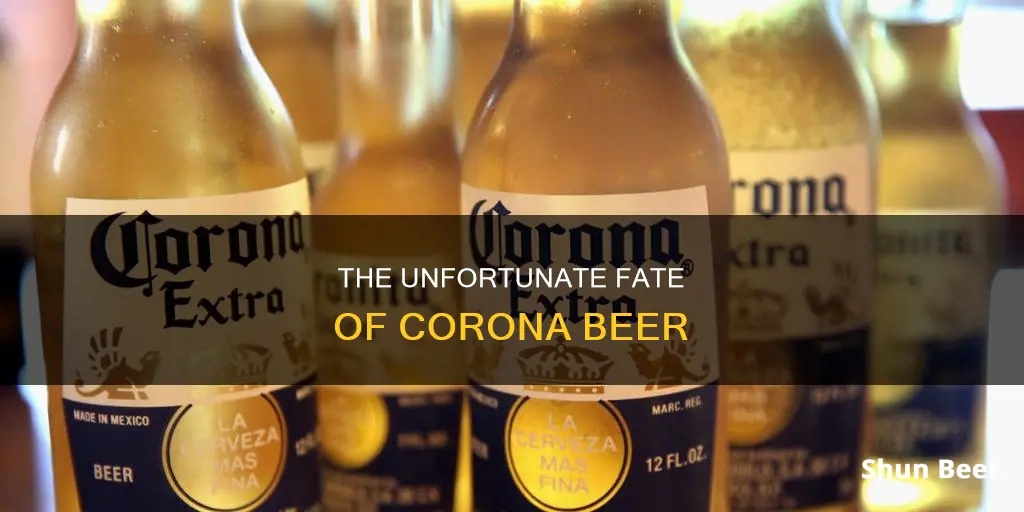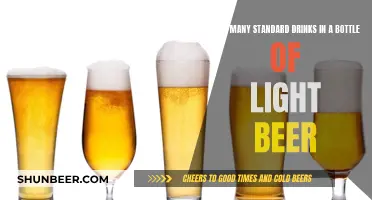
In 2020, Google searches for beer virus and Corona beer virus were on the rise, coinciding with the spread of the novel coronavirus (COVID-19) beyond Wuhan, China. This led to the misconception that the virus was related to Corona beer. However, the coronavirus has nothing to do with the beer, and the two are entirely different. Corona is a popular Mexican beer that has been brewed since 1925 and is known for its distinctive clear bottle and wedge of lime. On the other hand, the coronavirus is a family of viruses named for the Latin word corona, meaning crown, due to the spikes on their surfaces resembling little crowns. While the beer and the virus share a name, it is important to distinguish between the two and not spread misinformation.
| Characteristics | Values |
|---|---|
| Country of Origin | Mexico |
| ABV | 4.5% |
| Flavour | Citrusy and light |
| Variants | Extra, Light, Premier, Familiar, and Refresca |
| Price (12 pack, 12 fl oz bottles, 9.2 proof) | $13.5 |
What You'll Learn

The 1987 'urine in Corona' hoax
In 1987, a nasty rumour about Corona beer containing urine started circulating in the United States. This rumour nearly derailed the Mexican lager, which had been a mainstay at stateside bars and beaches for decades.
The hoax began when Chicago-based beer wholesaler Barton Beers Ltd. started shipping Corona Extra from the Midwest to states in the Northeast, where Corona did not yet have the permits to sell its beer. By the time the beer reached Manhattan, the bottles looked like they had been through the wringer. This led some drinkers to believe that the brewery was not the most sanitary place, and the rumour that Corona contained urine began to spread.
The rumour was further fuelled by false claims that CBS News programme '60 Minutes' had aired footage of a sewage ditch feeding directly into Corona's brewery. In reality, no such clip ever existed. The hoax also amplified racism towards Hispanic products and culture.
Corona distributors like Barton and parent company Grupo Modelo knew they had a PR nightmare on their hands. They issued press releases, put executives on talk shows, and spent roughly $500,000 (over $1.3 million in 2023 money) to broadcast a PSA regarding the hoax. They also did some sleuthing to find out who started the rumour. It turned out to be Luce & Sons, a fellow beer wholesaler based in Reno, Nevada, that carried Heineken, a competitor Corona was slowly catching up to.
Barton Beers took immediate legal action against Luce & Sons, slamming them with a $3 million lawsuit. While the initial lawsuit was dropped, Luce & Sons did agree to pay an out-of-court settlement and publicly announce that Corona is "free of any contamination."
Drinking Beer at Horny Corner: Is It Allowed?
You may want to see also

Corona's history and brewing process
Corona is a Mexican beer, first brewed in 1925 at the Cervecería Modelo (Grupo Modelo) company in Mexico City, Mexico. The brewery was founded to celebrate the 10th anniversary of Grupo Modelo, which is now one of the largest brewers in Mexico. Corona's origins reflect the influence of German immigrants in Mexico, as many of the early brewers were of German heritage and the first original brew was inspired by German brewing techniques.
Corona's distinctive clear glass bottle was a strategic choice that set it apart from other beers. This packaging showcased the beer's pale golden colour and became a key aspect of its brand identity. The name 'Corona' and its logo were inspired by the crown (or 'corona' in Spanish) worn by Our Lady of Guadalupe in the Cathedral of Our Lady of Guadalupe in the city of Puerto Vallarta.
The unique, aggressive and innovative marketing strategies of Grupo Modelo were key to Corona's success. In 1937, the company began to market Corona Extra as a fine-quality product to distinguish it from its rival beverage in Mexico, an indigenous drink called pulque. Grupo Modelo's advertising caused the decline of pulque and led to the everlasting increase in Corona's popularity, resulting in it being declared the Mexican beer.
Corona's international expansion began in the southern and southwestern regions of the US, with American tourists returning from Mexico bringing a taste for the beer they had enjoyed on sunny beaches. In 1979, Corona Extra was introduced in the US and quickly became synonymous with the American beach and barbecue lifestyle.
Corona's popularity in the US grew rapidly, especially in coastal regions, and its association with warm weather, relaxation and outdoor activities further enhanced its appeal. The iconic clear bottle, adorned with a lime wedge, symbolised the Corona brand and its laid-back, carefree lifestyle.
Corona is primarily brewed and produced in Mexico by Grupo Modelo, but the company has established partnerships with American and international breweries for local production to meet demand worldwide.
The brewing process involves several stages, including malting, mashing, boiling, fermentation and maturation. Each stage is closely monitored by experienced brewers who ensure that every batch meets the brand's strict quality standards. Grupo Modelo has implemented rigorous quality control measures, including regular testing of raw materials, monitoring of brewing parameters and sensory evaluations, to ensure that Corona offers the crisp, refreshing taste that consumers expect.
Beer and Driving: Safe After One?
You may want to see also

Corona's popularity and brand recognition
Corona is a popular beer brand, especially among younger generations. In a consumer survey conducted by YouGov in Q4 2023, it was found that US millennials and Gen X tend to favour foreign beers, with Mexican beers like Corona ranking highly among their preferences. In fact, Corona Extra was ranked as the second most popular beer for US millennials, while Corona Light made it into the top 5. Similarly, Corona Extra was also listed as one of the top 10 beers for Gen X.
Corona has also been a popular choice for drinkers in the United States for decades, with its clear bottle showcasing a deep-gold brew, often garnished with a lime wedge. Its popularity in the US has been so significant that it has been referred to as "America's easy-drinking beach beer of choice". By 1999, Corona had become the best-selling imported beer in the country, a title that it has held on and off ever since.
Corona's success is not limited to the United States, as it has also achieved worldwide recognition. In 2024, Corona Extra reclaimed the title of the world's most valuable beer brand, with a brand value of US$10.4 billion, surpassing Heineken. This increase in brand value solidified Corona as an iconic Mexican beer, leading the way in terms of brand value and consumer preferences for premium offerings.
In addition to its commercial success, Corona has also been strategically expanding its brand recognition. In 2024, Corona Cero became the official sponsor of the Paris 2024 Olympics, marking a historic moment as the first beer brand to sponsor the event. This initiative, along with other strategic efforts, has contributed to the brand's growing reputation and awareness globally.
Beer and Rapaflo: Safe Mix or Health Risk?
You may want to see also

Corona's variants and prices
Coronas Variants and Prices
Corona Beer is a Mexican brand of beer that has been brewed since 1925 and is considered one of the best-known beer brands worldwide. It is the top-selling imported beer in the United States and is also popular in other countries, such as India. The brand's most well-known variation is Corona Extra, a pale lager that is often served with a wedge of lime or lemon to add tartness and flavour.
In addition to Corona Extra, there are four other variants of Corona beer: Light, Premier, Familiar, and Refresca.
- Corona Light is a pilsner-type lager with a refreshing taste and a clean, crisp finish. It is designed for those who want a light beer without compromising on flavour.
- Corona Premier is a low-carb option, with only 90 calories and 2.6 grams of carbohydrates per 12 fl oz bottle. It has a smooth and refined flavour, making it a perfect choice for casual gatherings or a relaxing drink after a long day.
- Corona Familiar pays homage to the brand's heritage and authenticity. It has a higher alcohol content and a fuller flavour than the other variants, making it ideal for small get-togethers with family and friends.
- Corona Refresca brings the tropical fruits of Mexico to your glass, with flavours like Coconut Lime, Guava Lime, and Passionfruit Lime. It has a bright, tropical taste and a lower alcohol content of 4.5%.
The price of Corona beer varies depending on the variant and the quantity purchased. Here are the average prices for each variant in the United States:
- Corona Extra:
- 6 pack, 12 fl oz cans, 9.2 proof – $8.5
- 12 pack, 12 fl oz cans, 9.2 proof – $13.5
- 6 pack, 12 fl oz bottles, 9.2 proof – $8
- 12 pack, 12 fl oz bottles, 9.2 proof – $13.5
- 18 pack, 12 fl oz bottles, 9.2 proof – $19
- 24 pack, 12 fl oz bottles, 9.2 proof – $24
- Corona Light:
- 12 pack, 12 fl oz bottles, 8 proof – $13.5
- Corona Premier:
- 12 pack, 12 fl oz bottles, 8 proof – $13.5
- Corona Familiar:
- 12 pack, 12 fl oz bottles, 9.6 proof – $13.5
- Corona Refresca:
- 12 pack, 12 fl oz cans, 9 proof – $13.5
In India, the prices vary by city, but Corona Beer is known for its affordability and quality. In Delhi, for example, the cost of a 12-pack of Corona Extra Premium Beer is 3000 INR, while a 6-pack of the same variant is 1500 INR. The Light Lager variant is also popular, with a 6-pack costing 1300 INR and a 12-pack priced at 2500 INR.
Beer and Metformin: Is Light Beer Safe?
You may want to see also

Corona's unique serving style with a lime wedge
Corona is a Mexican lager that has been brewed since 1925 and is considered one of the best-known beer brands in the world. It is often served with a lime wedge, but the reason for this addition is not entirely clear. There are several theories as to why this tradition began, and it may be a combination of factors that led to the pairing's popularity.
One theory is that the lime is used to kill germs and disinfect the bottle's tip. This idea is supported by the claim that metal caps used to seal Corona bottles sometimes left rust marks on the rim, and the lime's acidity could remove rust and sterilize the bottle. Additionally, drinking water in Mexico is known for its deleterious effects on health, so the lime may have been seen as a way to combat this issue.
Another theory suggests that Corona's clear bottles leave the beer vulnerable to light exposure, which can cause the bitter alpha acids in the beer to transform and create a skunky flavour and aroma. The fragrance of lime juice is thought to help mask this undesirable odour.
Some people also believe that the lime is meant to keep flies out of the beer, as citrus is a natural bug repellent. This theory is supported by claims that prior to the lime slice, fly spray used to be used to keep flies away, but it adversely affected the taste of the beer.
The most likely scenario, however, may be that a bartender started the trend in 1981 as a marketing ploy to increase the marketability of the Mexican lager. This story is reported in several sources and is generally credited with helping Corona become the best-selling imported beer in the US.
Whatever the origin of this unique serving style, it is now hard to imagine drinking a cold Corona without a lime wedge. The brand has certainly embraced the association with lime, featuring citrus in practically every advertisement.
Lovastatin and Beer: A Safe Mix?
You may want to see also
Frequently asked questions
No, this is not true. Corona is one of the best-known beer brands in the world and is the 5th best-selling beer brand globally.
People did not stop drinking Corona beer. However, in 1987, a rumour spread that Corona contained urine, which affected sales in some US regions.
In 1987, a rumour spread that Corona contained urine. This rumour started when Chicago-based beer wholesaler Barton Beers Ltd. began shipping Corona Extra to the Northeast, where Corona did not yet have the permits to sell its beer. The beer passed through many hands, and by the time it reached Manhattan, the bottles looked dirty, which fuelled the rumour.
Yes, sales went stagnant and momentarily tanked in a few US regions. However, the brand managed the crisis by issuing press releases and securing spots on talk shows for executives to clear the air. Eventually, the joke got old, and it did little to affect Corona's sales trajectory in the long run.







